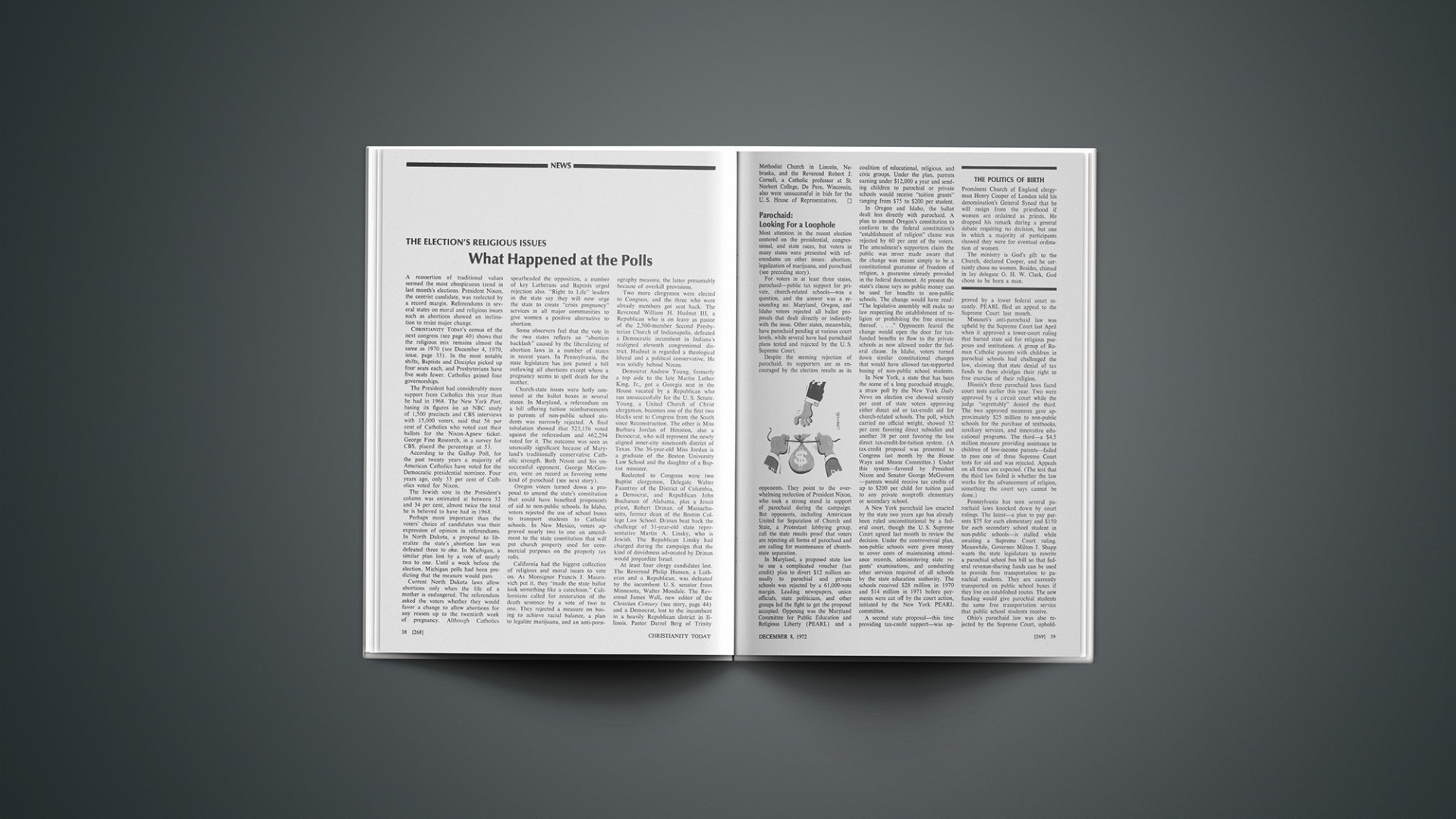A reassertion of traditional values seemed the most conspicuous trend in last month’s elections. President Nixon, the centrist candidate, was reelected by a record margin. Referendums in several states on moral and religious issues such as abortions showed an inclination to resist major change.
CHRISTIANITY TODAY’s census of the next congress (see page 40) shows that the religious mix remains almost the same as 1970 (see December 4, 1970, issue, page 33). In the most notable shifts, Baptists and Disciples picked up four seats each, and Presbyterians have five seats fewer. Catholics gained four governorships.
The President had considerably more support from Catholics this year than he had in 1968. The New York Post, basing its figures on an NBC study of 1,500 precincts and CBS interviews with 15,000 voters, said that 56 per cent of Catholics who voted cast their ballots for the Nixon-Agnew ticket. George Fine Research, in a survey for CBS, placed the percentage at 53.
According to the Gallup Poll, for the past twenty years a majority of American Catholics have voted for the Democratic presidential nominee. Four years ago, only 33 per cent of Catholics voted for Nixon.
The Jewish vote in the President’s column was estimated at between 32 and 34 per cent, almost twice the total he is believed to have had in 1968.
Perhaps more important than the voters’ choice of candidates was their expression of opinion in referendums. In North Dakota, a proposal to liberalize the state’s abortion law was defeated three to one. In Michigan, a similar plan lost by a vote of nearly two to one. Until a week before the election, Michigan polls had been predicting that the measure would pass.
Current North Dakota laws allow abortions only when the life of a mother is endangered. The referendum asked the voters whether they would favor a change to allow abortions for any reason up to the twentieth week of pregnancy. Although Catholics spearheaded the opposition, a number of key Lutherans and Baptists urged rejection also. “Right to Life” leaders in the state say they will now urge the state to create “crisis pregnancy” services in all major communities to give women a positive alternative to abortion.
Some observers feel that the vote in the two states reflects an “abortion backlash” caused by the liberalizing of abortion laws in a number of states in recent years. In Pennsylvania, the state legislature has just passed a bill outlawing all abortions except where a pregnancy seems to spell death for the mother.
Church-state issues were hotly contested at the ballot boxes in several states. In Maryland, a referendum on a bill offering tuition reimbursements to parents of non-public school students was narrowly rejected. A final tabulation showed that 523,156 voted against the referendum and 462,294 voted for it. The outcome was seen as unusually significant because of Maryland’s traditionally conservative Catholic strength. Both Nixon and his unsuccessful opponent, George McGovern, were on record as favoring some kind of parochaid (see next story).
Oregon voters turned down a proposal to amend the state’s constitution that could have benefited proponents of aid to non-public schools. In Idaho, voters rejected the use of school buses to transport students to Catholic schools. In New Mexico, voters approved nearly two to one an amendment to the state constitution that will put church property used for commercial purposes on the property tax rolls.
California had the biggest collection of religious and moral issues to vote on. As Monsignor Francis J. Maurovich put it, they “made the state ballot look something like a catechism.” Californians called for restoration of the death sentence by a vote of two to one. They rejected a measure on busing to achieve racial balance, a plan to legalize marijuana, and an anti-pornography measure, the latter presumably because of overkill provisions.
Two more clergymen were elected to Congress, and the three who were already members got sent back. The Reverend William H. Hudnut III, a Republican who is on leave as pastor of the 2,500-member Second Presbyterian Church of Indianapolis, defeated a Democratic incumbent in Indiana’s realigned eleventh congressional district. Hudnut is regarded a theological liberal and a political conservative. He was solidly behind Nixon.
Democrat Andrew Young, formerly a top aide to the late Martin Luther King, Jr., got a Georgia seat in the House vacated by a Republican who ran unsuccessfully for the U. S. Senate. Young, a United Church of Christ clergyman, becomes one of the first two blacks sent to Congress from the South since Reconstruction. The other is Miss Barbara Jordan of Houston, also a Democrat, who will represent the newly aligned inner-city nineteenth district of Texas. The 36-year-old Miss Jordan is a graduate of the Boston University Law School and the daughter of a Baptist minister.
Reelected to Congress were two Baptist clergymen, Delegate Walter Fauntroy of the District of Columbia, a Democrat, and Republican John Buchanan of Alabama, plus a Jesuit priest, Robert Drinan, of Massachusetts, former dean of the Boston College Law School. Drinan beat back the challenge of 31-year-old state representative Martin A. Linsky, who is Jewish. The Republican Linsky had charged during the campaign that the kind of dovishness advocated by Drinan would jeopardize Israel.
At least four clergy candidates lost. The Reverend Philip Hansen, a Lutheran and a Republican, was defeated by the incumbent U. S. senator from Minnesota, Walter Mondale. The Reverend James Wall, new editor of the Christian Century (see story, page 44) and a Democrat, lost to the incumbent in a heavily Republican district in Illinois. Pastor Darrel Berg of Trinity Methodist Church in Lincoln, Nebraska, and the Reverend Robert J. Cornell, a Catholic professor at St. Norbert College, De Pere, Wisconsin, also were unsuccessful in bids for the U. S. House of Representatives.










